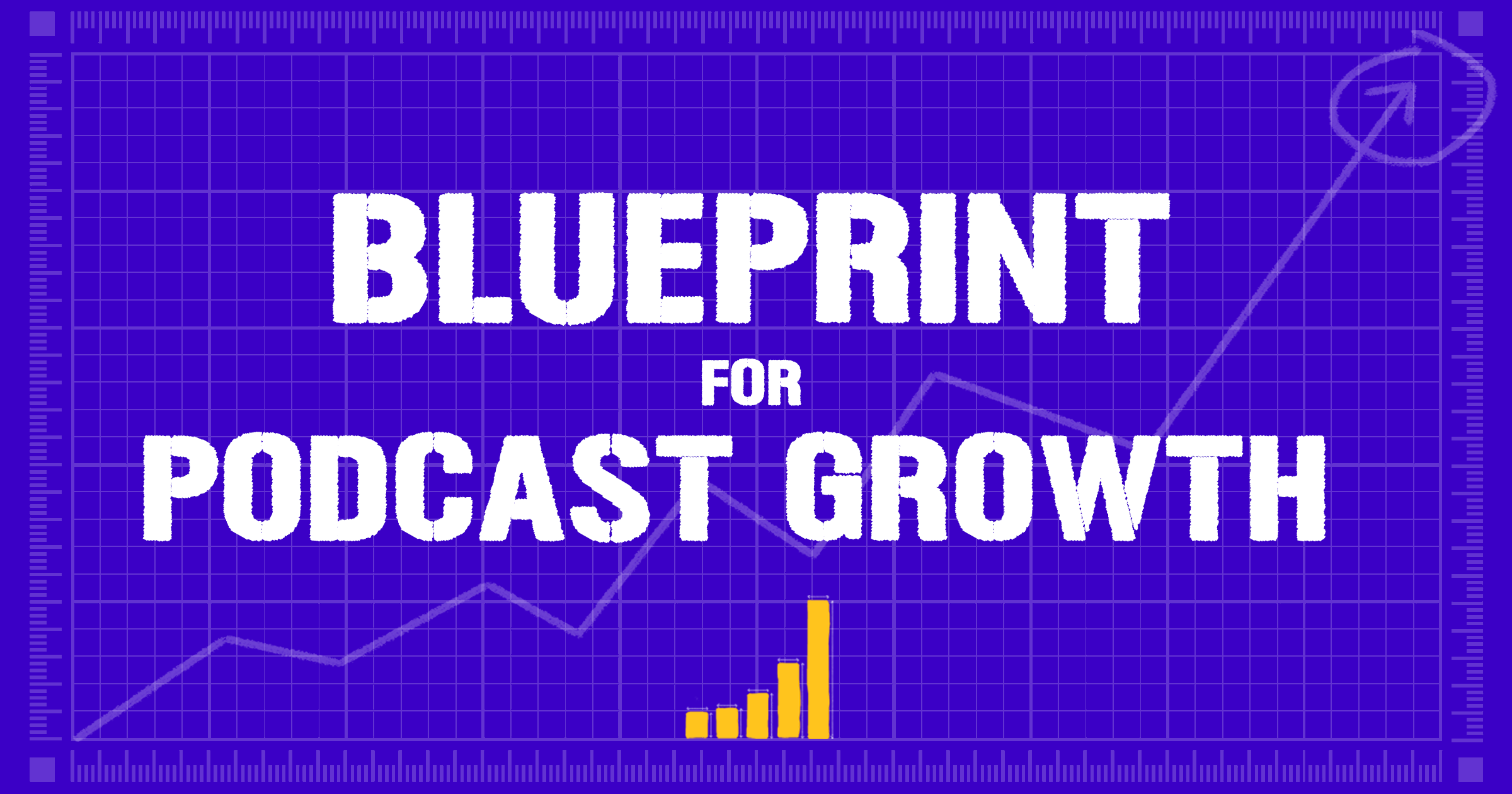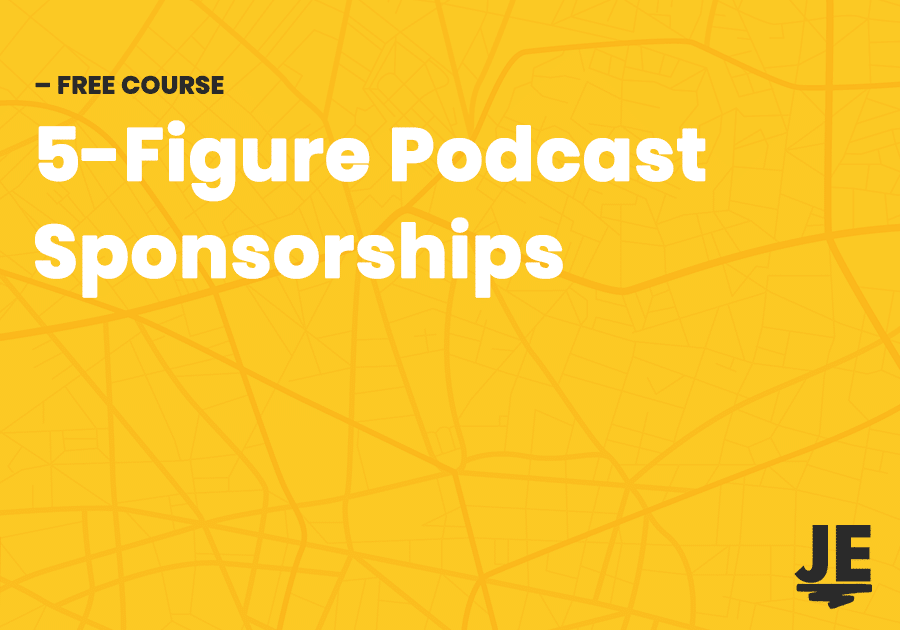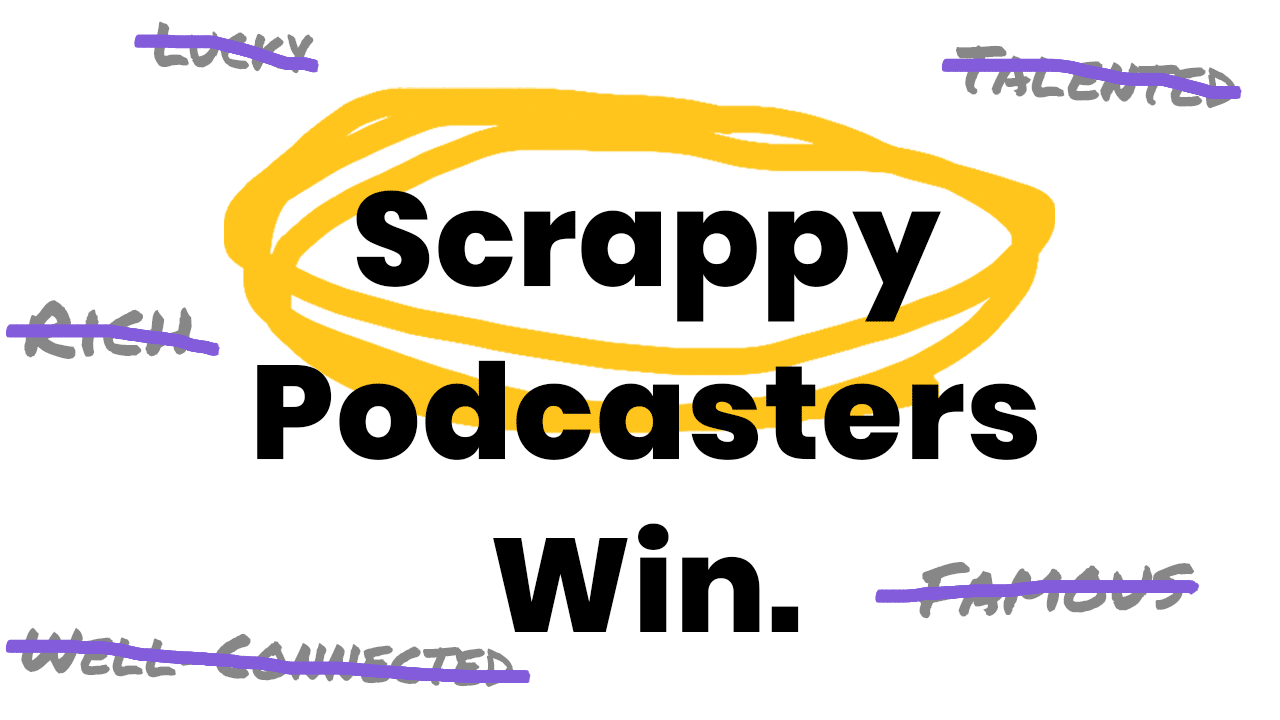I was in the middle of a consulting call with a client starting a new show when it hit me.
He had just asked me what, in my experience, independent podcasters who grew their shows to start bringing in some serious income were doing that others weren’t.
Now, there are a lot of things that podcasters that are achieving the goals of their shows are doing that most others aren’t.
There’s the time commitment, consistency, investment in their own knowledge and education around podcasting and online business, a roadmap of where their podcast is going and how it fits into their larger brand or business (or how they will create a business around their podcast).
All of these things are essential, but in that moment that this other piece clicked into place for me.
In my experience, podcasters who achieve huge success view themselves as community builders above all else.
Now I’d been thinking a lot about this topic already, but it wasn’t until this question was put to me that I actually looked at some of the podcasters I work with, as well as a handful of other big, well-known shows, and was able to tick that box as something that the hosts of said shows take very, very seriously.
The thing is, I’m pretty sure a lot of them stumbled into that role, and only upon realizing that they had an engaged community on their hands, started thinking harder about how to serve them in the best way possible.
In this article I want to dive into why viewing yourself as a community builder and leader is important as a podcaster, and how to be intentional with the community you create.
Why Is Building A Community Important?
Alright, so to start off, we’re going to differentiate between having an audience or listener base and having a community around your show.
Let’s have a look at ESPN. They have an absolutely huge audience, right? But could you really say that they have a community? Maybe I’m showing my ignorance here, but I interact with ESPN fairly regularly, on TV, on their website, through my fantasy football league* that uses their platform.
* If you’re wondering, my team is called the Mount-Enns Men and we would have (should have) won the championship this year if not for a lineup setting snafu in week one of the playoffs… I’m not bitter at all as you can tell…
Yet despite all that engagement, I don’t feel any sense of community around the brand.
Now let’s look at, let’s say… Oprah*. Again, huge audience, but this time, there is a distinct community that she and her brand have created.
* Wow, Oprah is coming up a lot on the blog lately…
Now, I know that’s not a perfect example. You might even say it’s not fair. Oprah is one person with a distinct personality with whom we can identify with. ESPN has dozens or hundreds of shows, publications, platforms and so on.
That might be true, but have another look at Oprah’s brand. She’s not the one writing every article for her magazine, and is not producing every episode of every show on her network, right?
I Thought You Were Going To Tell Us Why Community Is Important…
Let’s look at someone in the podcasting world with a thriving and proselytizing community: Pat Flynn.
I don’t know how many times I’ve had the conversation with various people – all of whom happen to be fans of his – that we just feel compelled to give him our money.
Now that’s not to say that I send him PayPal donations or buy every single product he puts out, but let me tell you, whenever he does come up with something new, even when it would serve zero purpose to me, I have to convince myself out of buying it just because, “Hey, it’s Pat, I want to help him out.”
Keep in mind that I’ve long since stopped listening to his podcast weekly, I’m much more of a spot listener now, and yet I still identify heavily with him and his brand.
Weird right?
No, not weird. Community, and loyalty to the person who’s worked so hard to create the community from which I’ve gained so much.
Wouldn’t you like to have a lineup of people whose default setting is to buy anything you come up with?
Yes. Yes you would. And that’s the power of a highly engaged community.
But let’s be clear. Pat didn’t build that community overnight, and neither will you. Let’s look at some of the challenges and have some #realtalk on what goes into building a community, should you decide to take this seriously and go for it.*
* You should.
What It Takes To Build A Strong, Engaged Community
Alight, so I know you’re riding high from that image of people lined up to buy whatever it is you’re creating every time you put it out there, but let’s have a look at what goes into building a community, and why most podcasters fall short.
1. Building Community Takes Time
I mean this in two ways.
The first is that it’s going to take months of work to develop your community. At the start, it’s most likely going to be depressing at times, and feel like you’re throwing away your time trying to build a community that may very well never materialize.
Secondly, it’s going to take up a lot of time in your day to day activities.
As someone who stumbled into community building when I started The Cut The Bullshit Podcast Community
8 months ago, I can speak to both of these.
I would say that in the average week, I probably spend 10-20 hours on community-related tasks.
That’s a part-time job.
The thing is that I know it’s worth it, and I know that without putting that time in constantly guiding the tone and culture of the community, it would quickly devolve into just another group filled with people promoting themselves ad nauseam and surface level conversations that have already been had 100 times before.
I can tell you that it gets easier though. Once people buy into and take ownership of the community and what it stands for, you are going to be brought to tears (at least I am) by seeing the values and goals with which you started your community being embraced, reflected and advanced by others. And that leads us into the second requirement.
2. You Need A Vision For What The Community Represents
This might just be the most important duck you need to have in your row before starting to grow your community. Sure, the values and focus will shift and mature over time, but you need to have a vision of what your collective group stands for, what your values are, what your purpose is, and so on.
If you don’t, don’t be surprised if all hell breaks loose and you lose control entirely.
As I mentioned, I kind of stumbled into the role of community builder with the CTBS Facebook group. Looking back I struggle to think of why exactly I started it, other than the fact that I wanted more than I was getting from the podcasting groups already in existence.
I do know that what I felt was lacking, and therefore what I wanted promote and prioritize in the one I was starting was Heart, Vulnerability, Fun & Goofiness, and in depth discussions on mindset and other topics beyond the basic technical questions we’ve all heard a thousand times.
A good place to start would be to come up with a vision statement for your community. Probably many of the values will be identical to those of your podcast, but I’ve found that once you move to be inclusive of a broad range of people beyond yourself and maybe your co-host(s) there are some additional considerations.
3. Communities Need Leadership
Ok, so I know I said having a vision for what your community represents might be the most important thing, but once you have that vision, you need to promote that vision among whatever community you have, even if that’s 5 other people at the start.
Sure, you could (and probably should) post some community guidelines, values, and rules somewhere, but if you think that that’s enough to spread your vision for the group, I’m sorry to say this, but you’re just plain wrong.
It’s my opinion that the only way way to truly spread your values and those of the community to the rest of your members is by example. This is why I spend 10-20 hours of week on CTBS stuff.
Community leadership comes through in the conversations you start with the questions you ask of your audience, the way you engage with them, how you answer questions, any branding you have in your online or in person gathering places, the content you share, and so on.
You’ll find over time that there will be members who will naturally take it upon themselves to become leaders in the community. Make sure you honour these people and their efforts to let them know how much you appreciate them. They’ll make your life – and the community – a lot better.
Converting Listeners Into Community Members
Alright, so when it comes to podcasting, you’ve got one prominent challenge in the way of building community.
This is the fact that your listenership is a disparate group of individuals who have no link to anyone but you, and even that link seems awfully one directional most of the time. What’s more, most people are probably doing other things while listening to your show. It’s not so easy to just leave a comment after they finish listening as it is at the bottom of a blog post.
So first things first, you’re going to need to decide on a platform on which to build your community.
You have a fair amount of choice when it comes to platforms, and I know people who are using all of them successfully to engage their podcast listeners and grow the community beyond the show itself.
Here are some of the more popular options:
- Facebook Groups
- Facebook Pages
- Blog Comments Sections
- Membership Sites (can be either paid or free)
Each of the platforms have advantages and disadvantages, and as I mentioned above, I know podcasters who have made incredibly effective use of each of them. Use whatever feels most natural to you.
Make Sure People Know Where And How To Engage
Ok, so once you’ve settled on a platform, you’re going to need to promote it*.
* Yes, I know everyone hates promotion, but it simply must be done
By the way, if you want a guideline on how to promote your individual podcast episodes, check out this checklist!
Anyways, back to promoting your community. It’s actually incredibly simple.
On every episode you do, make sure that you’re telling your listeners where they can interact with you. Even better, give them a specific question or conversation starter to get people talking.
Ask people about their thoughts on something you talked about on the episode, or who they’d like to see on as guests, or basically anything else. My experience is that the more specific you are with your questions, the more likely people are to respond.
Be warned: This is where you’re going to need to have some patience.
In my case, I spent 3 or 4 months posting conversation starters Every. Single. Day. with very minimal interaction or engagement, especially at the start.
BUT. You can create some really great relationships with your early community members, and they will likely become some of your biggest allies in growing the group and engaging more people.
Also keep in mind that while it can be straight up depressing at the start, at some point your community will hit a critical mass, and then the fun really starts! For me, that took about 6 months and it was when the group hit 150 people that the magic really started happening.
Adopting A Community-Building Mindset
Alright, so choosing a platform and promoting it are the easy part. The hard part is answering the question of why should people take part in the community?
What are they getting out of the community that they’re not getting on the podcast? Why should they spend their time hanging out with you and your peeps rather than doing something else? Or hanging out with someone else and their peeps??
The answer to that is going to be different for each podcast, podcaster, and community, but it probably relates back to that vision statement you created for it 😉
That said, here are some thoughts on what you have to offer as a community builder, and where you should spend your time.
1. You & Your Personality
This one’s pretty easy. If people connect with you and your personality, insights, and mindset on your show, they’re probably going to want to spend more time with you in a more one-on-one setting.
The challenge for a lot of podcasters is actually letting their hair down enough to display their quirks and idiosyncrasies.
In my experience, people can find information anywhere, so if all you are is a conduit for information, you’re not going to get far. People will keep coming back however, to someone who they truly connect with, who they can relate to, while also informing or entertaining them.
Keep in mind, your personality isn’t going to appeal to everyone, so stop trying to. It’s much better to have a small group love you, than a huge group not hate you.
2. Facilitating Connection Between Members
This is something I never would have thought of starting out, but in my opinion has been one of the biggest values-adds in the CTBS community.
People like connecting with others who share their interests, who can help them, or whom they can help. The thing is – especially online – most people also don’t know who they should connect with, and even if they do know, might feel weird about reaching out themselves.
This is where you can really shine as the leader of a community. You’ll probably know more of, and more about your members than anyone else, and as such, are in a prime position to connect people who you think should probably know each other, or may be of service to each other.
I can’t tell you how much my heart is warmed when I see CTBS peeps going on each other’s podcasts, cross promoting, or meeting up in person.
3. Offering A Different Experience To That Of Your Podcast
This should be fairly clear, but I think it’s worth stating anyways.
The way in which you approach your content and interaction with your community should be an extension of your podcast, not a replication of it.
If the goal of your podcast is to educate, inform, or entertain a large group of people, the goal of your community should be to go deeper and create more personal relationships with individuals. It might also be a less formal, more fun environment. Huzzah!
For example. I write all of my blogs myself and don’t do interviews on this platform. In the CTBS, however, I like to have monthly Expert Q&A’s, group hangouts, and the occasional community challenges, in addition to a whooooole lot of personal conversations around specific, often individual topics. Some of those activities could be facilitated through the blog itself, but really the group environment lends itself more towards them.
4. Creating A Space Where People Are Comfortable To Communicate
I don’t need to tell you this, but this is probably not the default setting for an online community, and as such will take work and management to create.
That said, if you succeed in creating a forum where your members feel comfortable asking dumb questions, or sharing personal stories without feeling judged, you’ve got something great going, and should do everything in your power to protect and nurture it.
This might be the highest goal you can aspire to when creating a community, and is something that some of your members will appreciate more than you will probably ever know.
Be Prepared To Give
If there’s one thing I’ve learned from watching and studying the leaders of communities I’m a part of, as well as starting one from scratch myself, it’s that if you want to grow a community, you need to be prepared to give.
It sounds cliche, but I had no idea when I started out how much time or mental & emotional bandwidth creating and nurturing a community would take.
I also had no idea how much the community would give me in return, including some amazing new relationships, knowledge and insight far beyond the purview of the group, and a near steady stream of inspiration at the things people in the community are creating and striving towards.
That said, it’s not an undertaking for the faint of heart, or short on time. But if you’re up for the challenge and ready to give of yourself fully in service of the community, I think community building is one of the most important (and rewarding) things you can do for your podcast.
One last thing. While we’re on the topic of community, I’d love to give a big shoutout to everyone in the Cut The Bullshit Podcasting Community who make it the truly special place it is.
If you’re not in the community already, what are you waiting for?! Come say hi and let’s help each other make cool shit!
I’d love to hear your thoughts on what makes the communities that you engage with special? Have you attempted to grow a sense of community around your own podcast? Let me know all about it in the comments!
[mailerlite_form form_id=2]
- Why Wouldn’t They Just Google It? - March 14, 2021
- Before You Can Market Your Podcast, You Need To Create A Marketable Podcast - March 11, 2021
- Podcast Promotion & Marketing Are Different (Here’s How to Use Each Effectively) - March 10, 2021




